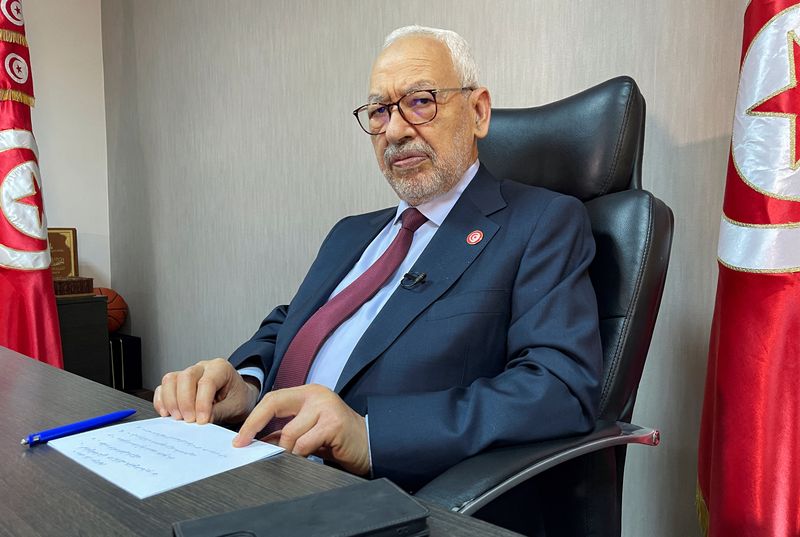By Tarek Amara and Angus McDowall
TUNIS (Reuters) -Tunisia’s main opposition party, the Islamist Ennahda, rejects President Kais Saied’s move to dissolve parliament and it will boycott any referendum he calls to restructure the political system unilaterally, its leader said.
Rached Ghannouchi, who is also parliament speaker, said in an interview that Ennahda would only take part in a referendum if Saied held national consultations on his political reforms.
Ghannouchi accused Saied of conducting a coup last summer when he suspended parliament, brushed aside the democratic 2014 constitution and moved to rule by decree.
“We are confident the Tunisian people… will not accept individual rule and will not accept an alternative to democracy,” Ghannouchi told Reuters at Ennahda’s Tunis headquarters.
The crisis escalated on Wednesday when Saied dissolved parliament after it held a session online in defiance of the “exceptional measures” he announced last year.
At least 20 parliament members who took part in the session, including from Ennahda, have been summoned for investigation by an anti-terrorism unit, Ghannouchi said.
“The move to dissolve the parliament deepens the political crisis and poses a greater threat to the economic situation and will destroy institutions,” Ghannouchi said, labelling Saied’s promise of a referendum on a new constitution “theatre”.
“We will not participate in a theatre piece devoid of democratic content and we expect many (other) parties to boycott it too,” Ghannouchi said.
Saied has said he will hold the referendum in July followed by parliamentary elections in December, but he has not involved any other political or civil society group in drafting the new constitution or said what it will contain.
Ghannouchi repeated calls for Saied to hold a “national dialogue”, something that other key figures have also demanded but which the president has yet to deliver.
Ghannouchi said that though he rejected Saied’s dissolution of parliament, that action meant the president should hold new elections within three months instead of waiting until after he imposed a new constitution.
Ennahda is the largest party in Tunisia with the biggest national organisation, though its popularity has waned over the past decade as it took part in successive coalition governments that failed to deliver economic gains.
“We will coordinate with the opposition to respond collectively to the president’s steps to restore democracy… Ennahda is still big and it can gather people on the streets,” Ghannouchi said.
(Reporting by Angus McDowall; editing by John Stonestreet)
